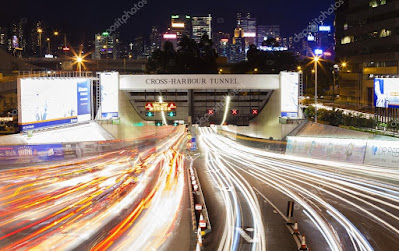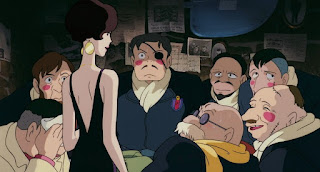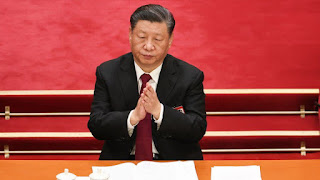 |
| Patten (left) and Vines have a good chat over dim sum |
Green Bean Media was started by former Hong Kong journalists who have migrated to the UK and want to keep reporting on news about their hometown.
They have followed people making the big move to the UK as well as developments in the 47 defendants charged in allegedly subverting the state for organising primaries, and Cantonese food.
Their latest video has garnered a lot of attention because it's an interview with Chris Patten, the last governor of Hong Kong. One might assume members of Green Bean Media were terrified of interviewing him themselves so they rounded up fellow exile journalist Steve Vines to do it.
The video is here: https://www.youtube.com/watch?v=MoA8iMymy8c&t=561s
And they aptly arranged to have the video interview in a cha chaan teng in London. The small cafe pulled out all the stops, giving "Fat Pang" the opportunity to eat some HK-style food, including his favourite egg tarts.
 |
| Patten's book on HK |
Personally doing food interviews, it seems rude to eat while someone is asking me questions, but Patten seems very happy to dig into the dishes even as Vines is asking him something!
The 29-minute video focuses on Patten's thoughts about Hong Kong in his book called The Hong Kong Diaries, from his personal diaries he kept when he was governor from 1992 to 1997.
In it he says foreign secretary and ambassador to Beijing Percy Cradock believed Patten should not have caused so much trouble trying to fight for democracy for Hong Kong, that he should have just done his five years as governor and then left quietly.
"He wrote the Chinese leaders may be thuggish dictators, but they're men of their word," recalls Patten. "We know that they were thuggish dictators, but one thing we know for certain is that they weren't men of their word."
Patten remembers speaking to British and Hong Kong businessmen who believed the average person was not interested in democracy, only in making money, and yet these elites had foreign passports tucked in their back pockets.
"It was always interesting when I looked at some of my critics just to think through what they would do if things went wrong," he says.
 |
| Cradock believed Chinese would keep their word |
He adds some of them have since passed, but did not reveal any of their names in the interview, which he should have done for the record.
Meanwhile Vines shares a conversation he had with a friend back in Hong Kong, as they previously believed through crises like SARS and the economic downturn that the city would bounce back, but this time they didn't have this optimism anymore.
"I think the reason why he and you are more pessimistic now is what the Chinese Communist Party wants is Hong Kong without Hongkongers," Patten says. "Maybe you have a city but you don't have a thriving city, you don't have a city with any heart."
He talks about how young people from Hong Kong come up to him and ask if they should go back and Patten says he has no answer. While he has seen from history authoritarian states have disappeared at the snap of fingers, he doesn't know when that will happen in China.
Vines mentions the BNO scheme, that has allowed over 140,000 Hongkongers to migrate to the UK with the possibility of settling there permanently.
Patten believes it is successful because people understand the plight of Hongkongers, and that they will be a boon to the UK economy.
 |
| Patten in Hong Kong on June 30, 1997 |
The former governor cites the example of meeting one man in his late 20s who had just qualified to become a doctor and was on his way to a job interview with the local health authority in Oxford.
"People from Hong Kong will make this a more successful country," he says. "They will be strong members of civil society."
He adds sardonically that perhaps the UK should thank the Chinese for giving them all these Hongkongers.
Vines' plight is also worth highlighting. He was a well known correspondent in Hong Kong, was the founding editor of the Eastern Express newspaper and Spike magazine, a commentator and interviewer on RTHK and author.
But after the national security law was implemented in July 2020, Vines began feeling the pressure of watching what he was saying and doing, even though he had written a book about the 2019 protests.
While he says in the video he found it unhealthy to be constantly watching his back, Vines did receive calls hinting it would be best if he left Hong Kong.
Within months he sold his food business and his flat in Sai Kung, packed up 34 years' worth of possessions and moved back to the UK in July 2021.
 |
| Vines was well known commentator on RTHK |
He is active in the Hong Kong community in the UK and says there isn't a day where he isn't talking to someone from the city or writing about it.
What comes through most in the interview is Patten's genuine love of Hong Kong and its people, and how he has carried the burden of wondering if he had done enough for them since 1997.
Which is why he is constantly advocating and doing whatever he can from his privileged perch, from writing to the Prime Minister about Jimmy Lai, to greeting migrants settling in their new home.
But once the interview is over, that good food can't go to waste, and Patten reaches over to pick up a slice of pork belly with his fingers.



















































